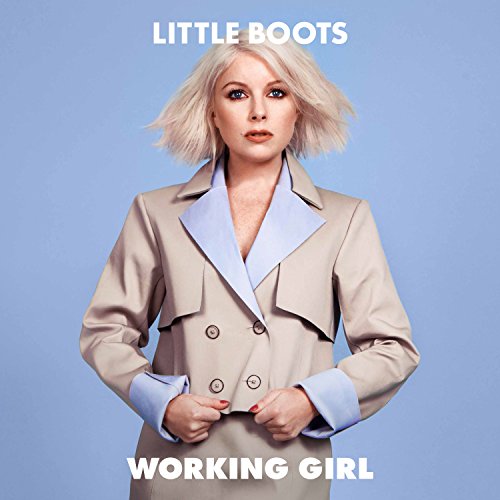
Little Boots
Working Girl
Release Date: Jul 10, 2015
Genre(s): Pop, Electronic, Pop/Rock, Alternative/Indie Rock, Dance-Pop, Club/Dance, Alternative Dance, Left-Field Pop
Record label: Dim Mak
Music Critic Score
How the Music Critic Score works
Buy Working Girl from Amazon
Album Review: Working Girl by Little Boots
Fairly Good, Based on 9 Critics
Based on rating 8/10
With a title inspired in part by the 1988 comedy-drama of the same name, Little Boots' third full-length album, 2015's Working Girl, showcases her trademark atmospheric '70s disco and '80s house-infused pop with ever increasing aplomb. A concept album, Working Girl revolves around Victoria Hesketh's (aka Little Boots') own journey from major-label fame with Atlantic Records in 2009 to independent success after founding On Repeat Records in 2013. The album follows Hesketh's equally conceptually minded 2014 EP Business Pleasure (all four tracks are included here) and finds her expanding upon that album's dual themes of creative transformation and professional empowerment.
Based on rating 3.5/5
“Sometimes I sing and dance around the house in my underwear. Doesn't make me Madonna, never will,” Joan Cusack quips in Mike Nichols's urban fairy tale Working Girl. Cusack's big-haired '80s lady was serving Melanie Griffith's titular heroine a sobering dose of reality that simply dressing the part sometimes isn't enough. But for the contemporary female pop singer, that realization can be a liberating one, emancipating her from the obligation to bear the weight of a crown or funnel creative energy into increasingly outlandish costumes or reinventions.
Based on rating B-
On her third album as Little Boots, English singer and producer Victoria Hesketh wears holes in the sheen she cultivated on her first two outings. That’s a good thing; while Hands and especially Nocturnes sparkled with club-ready production, Working Girl shows off more of Hesketh’s humor and charm. In a few places, it even makes room for her to be vulnerable inside her snappy pop arrangements.
Based on rating 3
It’s not quite worked out as planned for Victoria Hesketh aka Little Boots since the heady days of 2009. Back then, she was the winner of the BBC’s Sound of 2009 poll, beating the likes of Lady Gaga, La Roux and Florence & The Machine, she released a series of singles that sounded like instant pop classics (Stuck On Repeat, New In Town and Remedy), and the future looked bright on the release of her debut album Hands. Her follow-up, the Tim Goldsworthy-produced Nocturnes, despite having its moments, didn’t quite replicate its predecessor’s success, and Hesketh suddenly seemed swallowed up by the myriad of electro-pop competitors that she’d ironically helped swarm.
Based on rating 3/5
Refined, savvy pop music always has a job competing against its more lurid and lowest common denominator counterpart. This is Victoria “Little Boots” Hesketh’s third album of recherché electropop and, like its predecessors, Nocturnes (2013) and Hands (2009), it packs a selection of nagging tunes that could easily light up the mainstream as, say, the Pet Shop Boys once did, if rave-ified R&B didn’t exert such a stranglehold on the charts. Lead single Better in the Morning is about being a dirty stop-out, and imports Tom Tom Club’s singsong 80s lilting into the Nordic model of 21st-century chanson; hot US producer Ariel Rechtshaid (Haim, Vampire Weekend) is on board to smooth the transitions on the rest of this sharp album.
Based on rating 3/5
It’s all too easy to get swept up in the dream-laced pop of Little Boots’ third album. From the hypnotic bop of the title track through the sky-baiting sway of ‘Help To’ until the skipping animation of ‘Better In The Morning’, ‘Working Girl’ is full of effortless, glittering dance. However, as Victoria Hesketh’s aerial vocals on ‘Real Girl’ pull away from the sonic shimmy, “I didn’t promise I’d be perfect, I didn’t promise I would play the game,” the realisations hit like wave.
Based on rating 5/10
The Madonna comps were familiar for Little Boots straight out of the gate. On Working Girl, the third LP from the dance-pop songstress, she's leaning into the comparison more than ever. From the simple-yet-memorable clubby constructs to confident themes of empowerment, Little Boots is consciously following pop music's torchbearers. Unfortunately, she's not ready to carry one herself.
Based on rating 5/10
Victoria Hesketh’s metamorphosis from lead singer of indie-poppers Dead Disco to wry electro solo act Little Boots may not have changed the face of music as we know it, but it was pretty savvy: a low key bellwether for the end of indie’s Noughties dominance, and the beginning of a decade where producer-led digital pop has pretty much been the only game in the charts. But if Hesketh was the prophet for this new world, she didn’t exactly reap its rewards. Debut album Hands and attendant hit single ‘Remedy’ certainly did a hell of a lot more business than anything put out by the band she’d been in just a year before.
Based on rating 2/5
Long gone is the wide-eyed synth obsessive found on Little Boots’ first two albums, Hands and Nocturnes. The 2015 Victoria Hesketh, CEO of On Repeat Records, is a Working Girl: up at 5am, doused in Elnett and spending her days shouting “Buy! Sell!” into a massive brick phone. It takes two tracks to realise the 80s-executive aesthetic is a misnomer; her cute, perfectly produced pastel pop portrays an artist who is lonesome rather than independent, and distant rather than defiant.
'Working Girl'
is available now

